

American Patriots Carry Out Boston Tea Party. Needing money to pay off its considerable debts, the British government imposed a series of new taxes on the American Colonies in the 1760s.
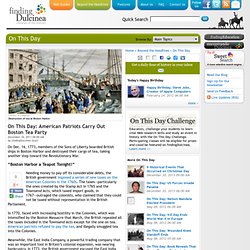
The taxes—particularly the ones created by the Stamp Act in 1765 and the Townsend Acts, which taxed import goods, in 1767—outraged the colonists, who claimed that they could not be taxed without representation in the British Parliament. In 1770, faced with increasing hostility in the Colonies, which was intensified by the Boston Massacre that March, the British repealed all the taxes included in the Townsend Acts except for the one on tea.
American patriots refused to pay the tax, and illegally smuggled tea into the Colonies. Meanwhile, the East India Company, a powerful trading company that was an important tool in Britain’s colonial expansion, was nearing bankruptcy. The Olive Branch Petition. Approved by the Continental Congress on July 5, 1775 To the King's Most Excellent Majesty.
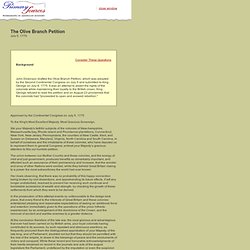
Most Gracious Sovereign, King George refuses Olive Branch Petition — History.com This Day in History — 9/1/1775. Richard Penn and Arthur Lee, representing the Continental Congress, present the so-called Olive Branch Petition to the Earl of Dartmouth on this day in 1775.
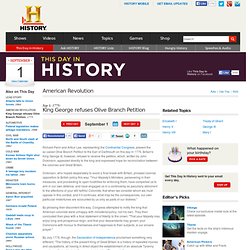
Britain's King George III, however, refused to receive the petition, which, written by John Dickinson, appealed directly to the king and expressed hope for reconciliation between the colonies and Great Britain. Dickinson, who hoped desperately to avoid a final break with Britain, phrased colonial opposition to British policy this way: "Your Majesty's Ministers, persevering in their measures, and proceeding to open hostilities for enforcing them, have compelled us to arm in our own defence, and have engaged us in a controversy so peculiarly abhorrent to the affections of your still faithful Colonists, that when we consider whom we must oppose in this contest, and if it continues, what may be the consequences, our own particular misfortunes are accounted by us only as parts of our distress.
" Olive Branch Petition. In July 1775, the Second Continental Congress made a final effort to seek reconciliation with Britain and end the fighting.
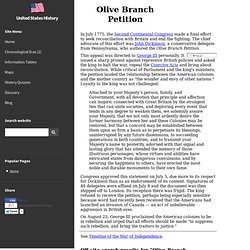
The chief advocate of this effort was John Dickinson, a conservative delegate from Pennsylvania, who authored the Olive Branch Petition. This appeal was directed to George III personally. It issued a sharp protest against repressive British policies and asked the king to halt the war, repeal the Coercive Acts and bring about reconciliation. While critical of Parliament and the king's ministers, the petition lauded the relationship between the American colonies and the mother country as “the wonder and envy of other nations.” Loyalty to the king was not challenged: Congress approved this statement on July 5, due more to its respect for Dickinson than as an endorsement of its content. On August 23, George III proclaimed the American colonies to be in rebellion and urged that all efforts should be made “to suppress such rebellion, and bring the traitors to justice.” British Parliament adopts the Coercive Acts — History.com This Day in History — 3/28/1774.
Upset by the Boston Tea Party and other blatant acts of destruction of British property by American colonists, the British Parliament enacts the Coercive Acts, to the outrage of American Patriots, on this day in 1774.

The Coercive Acts were a series of four acts established by the British government. The aim of the legislation was to restore order in Massachusetts and punish Bostonians for their Tea Party, in which members of the revolutionary-minded Sons of Liberty boarded three British tea ships in Boston Harbor and dumped 342 crates of tea—nearly $1 million worth in today's money—into the water to protest the Tea Act. Coming of the American Revolution: The Coercive/Intolerable Acts. On 17 December 1773 a group of men dressed as Mohawk Indians dump 342 chests of East India Tea into Boston Harbor.
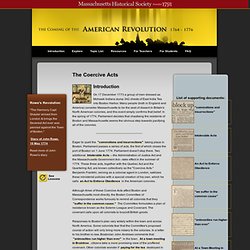
Many people (both in England and America) consider Massachusetts to be the seat of dissent in Britain's North American colonies, and this event simply confirms that belief. In the spring of 1774, Parliament decides that chastising the residents of Boston and Massachusetts seems the obvious step towards pacifying all of the colonies. Eager to quell the "commotions and insurrections" taking place in Boston, Parliament passes a series of acts, the first of which closes the port of Boston on 1 June 1774. Parliament doesn't stop there.
The Coercive Acts. Properly known as the Restraining Acts, the Coercive Acts, as they were popularly known in England, were introduced in 1774 by the new government of Lord North, who acted with the direct encouragement of George III.
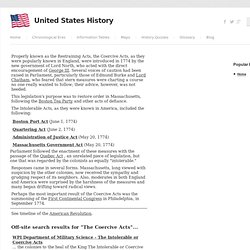
Several voices of caution had been raised in Parliament, particularly those of Edmund Burke and Lord Chatham, who feared that stern measures were charting a course no one really wanted to follow; their advice, however, was not heeded. This legislation's purpose was to restore order in Massachusetts, following the Boston Tea Party and other acts of defiance.